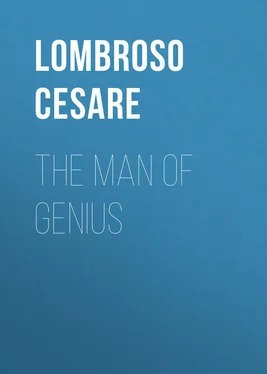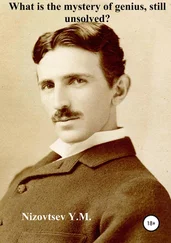Cesare Lombroso - The Man of Genius
Здесь есть возможность читать онлайн «Cesare Lombroso - The Man of Genius» — ознакомительный отрывок электронной книги совершенно бесплатно, а после прочтения отрывка купить полную версию. В некоторых случаях можно слушать аудио, скачать через торрент в формате fb2 и присутствует краткое содержание. Жанр: foreign_antique, foreign_prose, на английском языке. Описание произведения, (предисловие) а так же отзывы посетителей доступны на портале библиотеки ЛибКат.
- Название:The Man of Genius
- Автор:
- Жанр:
- Год:неизвестен
- ISBN:нет данных
- Рейтинг книги:5 / 5. Голосов: 1
-
Избранное:Добавить в избранное
- Отзывы:
-
Ваша оценка:
- 100
- 1
- 2
- 3
- 4
- 5
The Man of Genius: краткое содержание, описание и аннотация
Предлагаем к чтению аннотацию, описание, краткое содержание или предисловие (зависит от того, что написал сам автор книги «The Man of Genius»). Если вы не нашли необходимую информацию о книге — напишите в комментариях, мы постараемся отыскать её.
The Man of Genius — читать онлайн ознакомительный отрывок
Ниже представлен текст книги, разбитый по страницам. Система сохранения места последней прочитанной страницы, позволяет с удобством читать онлайн бесплатно книгу «The Man of Genius», без необходимости каждый раз заново искать на чём Вы остановились. Поставьте закладку, и сможете в любой момент перейти на страницу, на которой закончили чтение.
Интервал:
Закладка:
For the rest – and this is the point which concerns us most – the morbid effects and analogies are the same in both, since the man of talent, even without genius, presents various slight but real abnormalities. A man of even ordinary talent may be so exhausted as to exhibit the pathological central reactions of the most powerful genius, and to leave traces of degeneration in his offspring; and, although it is rare, it is not impossible for the man of talent to descend from the neurotic and insane. This may easily be explained: talent, like genius, is accompanied by cortical excitation, only in a less degree and in a smaller brain. The true normal man is not the man of letters or of learning, but the man who works and eats — fruges consumere natus .
But our nature, it is customary to say, revolts against a conception which tends to lower the most sublime manifestation of humanity to the level of the sorrowfully degenerate, to idiocy and insanity. It is sad, I do not deny, but has not nature caused to grow from similar germs, and on the same clod of earth, the nettle and the jasmine, the aconite and the rose? The botanist cannot be blamed for these coincidences; and since they exist it is not a crime that he should record them as he finds them. Repugnance also is a sentiment, not a reason; and a sentiment, moreover, which has not been shared by the race generally, who long ago reached conclusions – repugnant to the academic world, which sometimes closes its eyes in order not to see – entirely in harmony with the results here presented. We may see this in the most ancient etymologies; in Hebrew as well as in Sanscrit the lunatic is synonymous with the prophet. We may see it, too, in proverbs: “ I matti ed i fancialli indovinano ;” “ Kinder und Narren sprechen die Wahrheit ;” “ Un fol advise bien un sage ;” “ Sæpe enim est morio valde opportune locutus .” The lunatic, again, among barbarous people is feared and adored by the masses who often confide to him supreme authority.
In modern times the same conviction has been preserved, but in a form, it must be confessed, altogether disadvantageous to genius. Not only is fame (and until recent years even liberty), denied to men of genius during their lives, but even the means of subsistence. After death they receive monuments and rhetoric by way of compensation. And why is this? Neither the jealousy of rivals nor the envy of mediocre men is enough to explain it. The reason is that if we leave out certain great statesmen (though there are exceptions – Bismarck, for example), men of genius are lacking in tact, in moderation, in the sense of practical life, in the virtues which are alone recognized as real by the masses, and which alone are useful in social affairs. “ Le bon sens vaut mieux que le génie ,” says an old French adage. And as Mirabeau said, “Good sense is the absence of every strong passion, and only men of strong passions can be great.” Good sense travels on the well-worn paths; genius, never. And that is why the crowd, not altogether without reason, is so ready to treat great men as lunatics, while the lettered crowd cry out when – as I have attempted to do here – this general opinion is attached to a theory.
By some of those persons who have too much good sense – and who do not know that that destroys every great truth, because we reach truth more by remote paths than by smooth and ordinary roads – it has been objected: “Many of these defects that you find in great men may be found also in those who are not men of genius.” This is very true, but it is by the quality and quantity that the abnormal character is marked; and, above all, by the contradiction with the whole of the other characters of their personality, that the abnormality appears. Cooks are vain, but in those matters which refer to their occupation they are not so vain as to believe themselves gods. The nobleman will boast of descent from a mediæval hero, but not of being a sculptor. We are all forgetful sometimes, but not so far forgetful that we cannot recall our own names while at the same time we have an extraordinary memory for our own discoveries. Many have said what Michelangelo said of monks, but they have not afterwards spent large sums in fattening monasteries. In short, it is the doubling and contradiction of personality in genius which reveals the abnormality.
It has again been objected to me that these studies are deficient in utility. To this I might reply with Taine that it is not always necessary that the true should be useful. Yet numerous practical applications arise out of these researches; they furnish us with explanations of those strange religious insanities which become the nucleus of great historical events. The examination of the productions of the insane supply us with new sources of analysis and criticism for the study of genius in art and literature; and, above all, these data bring an important element to the solution of penal questions, for they overthrow for ever that prejudice by virtue of which only those are declared insane, and therefore irresponsible, whose reason has entirely departed, a prejudice which has handed thousands of irresponsible creatures to the executioner. They show us, lastly, that literary madness is not only a curious psychiatric singularity, but a special form of insanity, which hides impulses the more dangerous, because not easy to perceive, a form of insanity, which, like religious insanity, may be transformed into a historical event.
C. LOMBROSO.PART I.
THE CHARACTERISTICS OF GENIUS
CHAPTER I.
History of the Problem
Aristotle – Plato – Democritus – Felix Plater – Pascal – Diderot – Modern writers on genius.
IT is a sad mission to cut through and destroy with the scissors of analysis the delicate and iridescent veils with which our proud mediocrity clothes itself. Very terrible is the religion of truth. The physiologist is not afraid to reduce love to a play of stamens and pistils, and thought to a molecular movement. Even genius, the one human power before which we may bow the knee without shame, has been classed by not a few alienists as on the confines of criminality, one of the teratologic forms of the human mind, a variety of insanity.
This impious profanation is not, however, altogether the work of doctors, nor is it the fruit of modern scepticism. The great Aristotle, once the father, and still the friend, of philosophers, observed that, under the influence of congestion of the head, “many persons become poets, prophets, and sybils, and, like Marcus the Syracusan, are pretty good poets while they are maniacal; but when cured can no longer write verse.” 5 5 De Pronost. , i. p. 7.
And again, “Men illustrious in poetry, politics, and arts, have often been melancholic and mad, like Ajax, or misanthropic, like Bellerophon. Even in modern times such characters have been noted in Socrates, Empedocles, Plato, and in many others, especially poets.” 6 6 Problemata , sect. xxx.
In the Phædo , Plato affirms that “delirium is by no means an evil, but, on the contrary, when it comes by the gift of the gods, a very great benefit. In delirium, the prophetesses of Delphi and Dodona performed a thousand services for the citizens of Greece; while in cold blood they were of little use, or rather of none. It often happened that, when the gods afflicted men with fatal epidemics, a sacred delirium took possession of some mortal, and inspired him with a remedy for those misfortunes. Another kind of delirium, that inspired by the Muses, when a simple and pure soul is excited to glorify with poetry the deeds of heroes, serves for the instruction of future generations.”
Democritus was more explicit, and would not believe that there could be a good poet who was not out of his mind: —
Читать дальшеИнтервал:
Закладка:
Похожие книги на «The Man of Genius»
Представляем Вашему вниманию похожие книги на «The Man of Genius» списком для выбора. Мы отобрали схожую по названию и смыслу литературу в надежде предоставить читателям больше вариантов отыскать новые, интересные, ещё непрочитанные произведения.
Обсуждение, отзывы о книге «The Man of Genius» и просто собственные мнения читателей. Оставьте ваши комментарии, напишите, что Вы думаете о произведении, его смысле или главных героях. Укажите что конкретно понравилось, а что нет, и почему Вы так считаете.












